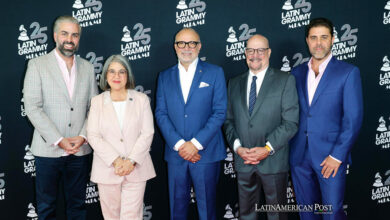Countdown to the Oscars: Black Panther
Listen this article
We will review the 8 films nominated for Best Film by the Academy this year. Black Panther will be the first of this special

In Black Panther, there is a family, a country and a royalty. The film begins with children playing basketball in a neighborhood in Oakland, California in 1992. One of those children will be the villain of this, the first superhero movie to be nominated for Best Film at the Academy Awards. This Sunday the film won the Best Cast award at the Actors Guild Awards, and last week the seven Oscar nominations were announced.
Leer en español: Cuenta regresiva para los Óscar: Black Panther
The argument
When his father dies, Prince T'Challa must assume the throne of Wakanda, an airtight African nation before the outside world. This measure is part of an attempt to protect vibranium, a valuable metal that is only found in Wakanda and with which the Wakandians have developed technologies that the rest of the world does not even know it exists. As before the United States has stolen vibranium from Wakanda and after centuries of oppression and colonization attempts, the Wakanda king has decided to close the border to protect his own. In the coronation of T'Challa, who will later be Black Panther, we can see, however, the dissatisfaction of one of the tribes who believe that the vibranium must defend itself with more zeal and strength.
Among the political oppositions with which T'Challa is on assuming power is that of her ex-girlfriend, the warrior Nakia, played by Lupita Nyong'o, who believes that Wakanda should share her raw material and technology with the rest of the world. There is also that of the border tribe, led by the king's best friend, played by Daniel Kaluuya, who, although he does not oppose him too strongly, does advise that the vibranium and its powers must remain secret.
So this film has an extraordinarily political and more complex argument than one would think. However, it is far from being a political drama, because it never loses sight of what the spectators went to see: a movie of superheroes. So it has excellent action scenes in which men and women are equally hard; typical Marvel jokes, now put in the mouth of a teenage genius, Princess Shuri, in a brilliant interpretation of Letitia Wright; excellent special effects, much better than the later Aquaman; costumes and creative gadgets; and good music.
Read also: These are the Oscar 2019 nominees
The villain
But who steals the show is Michael B. Jordan, who plays Killmonger, the illegitimate heir to the Wakanda throne. He is a bastard son of T'Challa's uncle, born in the United States. It could be said that Killmonger is a kind of dreamer: the son of immigrants who have lived in the ghetto all his life and had to see how the white man oppresses what he calls "his people." Killmonger, then, is an ex-CIA agent and Afghanistan veteran who has returned to Wakanda to claim the throne. T'Challa, who until very recently did not know about the existence of his cousin in the United States, does not know what to do about it, he only knows that he is "an outlaw" and that is why Wakanda can not govern.
Unlike the role of T'Challa, the superhero in good excess and interested in the common good, the character of Killmonger, the villain, is written with a high degree of complexity. The discourse of the villain can be summarized, on the one hand, in the slogan of the campaign of Donald Trump "Make Wakanda Great Again," because he is interested in closing the country and showing other nations how it superior through a war world in which weapons built with vibranium would have no competition. On the other hand, and ironically, his speech could also be summarized in the slogan of the Panteras Negras, a 1960s political party referred to by the film with its title, "All Power To The People", because it claims, as the king of Wakanda, to take to the royalty of their privilege and to empower not only the Wakandians but also the immigrants and slaves who live oppressed in other nations.
This speech, sophisticated and great, win the support of all the Wakandian spies around the world and the border tribe. And, seeing it, the viewer can see why: Killmonger has had to see his suffering, he himself has been ignored and oppressed. This figure we have seen before in Magneto in the X-Men movies, who faces his own to defend an idea of war against humans who have abused and denied the existence of mutants. It is not, then, a simple villain, "a bad," is a character resulting from a story.
Even the superhero, who ends up being the just ruler, ends up being, in part, in agreement with him. Although in some unfortunate dialogues T'Challa refers to his cousin as "monster", in the end he recognizes that "his people" do not live alone in Wakanda, but around the world and that it is his duty as king to give him power (and with power it refers to knowledge and technology) also to children who play basketball in the Oakland ghetto. I can not think of another superhero/villain relationship, in addition to Magneto and Professor X, classic friends/enemies, as impressive as this: in the end, the villain, who embodied resistance but also resentment, had some political impact about the superhero.
The film allows us to imagine the potential of the third world if it were a manufacturer and researcher of its raw material and also mocks the first world and the white man, who undervalues Africa and believes himself master of knowledge and technology. Also, it gathers Afro-fashion actors, increasing the representation of black youth on the screen. And, as if that were not enough, this film, anticolonialist and anti-imperialist, ends with an epilogue in which he throws Trump, because, in the words of the Black Panther, "the wise ruler creates bridges and not walls."
LatinAmerican Post | Juliana Rodríguez Pabón
Copy edited by Vanesa López Romero





